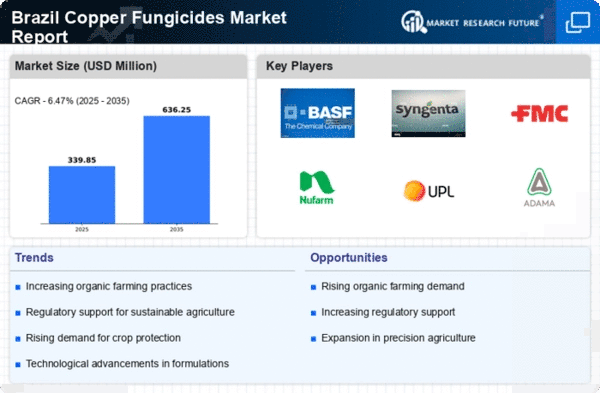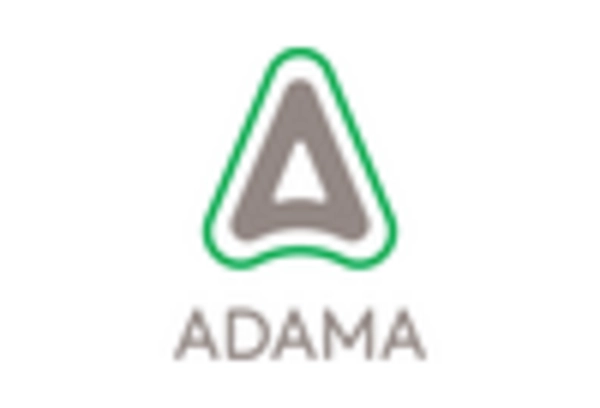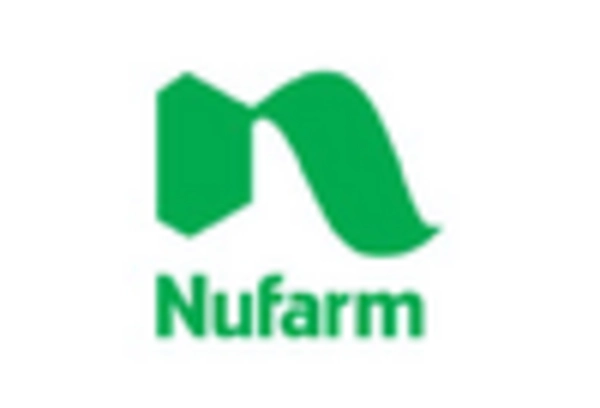Expansion of Agricultural Land
The expansion of agricultural land in Brazil is a significant driver for the copper fungicides market. As the country continues to increase its agricultural output to meet both domestic and international demand, the need for effective crop protection solutions becomes paramount. In 2025, Brazil's agricultural land is expected to increase by around 5%, leading to a higher incidence of crop diseases. This expansion necessitates the use of copper fungicides to protect crops from fungal infections, thereby enhancing yield and quality. The copper fungicides market is poised to grow as farmers seek reliable solutions to safeguard their investments in newly cultivated areas.
Rising Demand for Organic Produce
The increasing consumer preference for organic produce in Brazil is driving the The increasing consumer preference for organic produce in Brazil is driving the demand for copper fungicides.. As consumers become more health-conscious, they are seeking food products that are free from synthetic chemicals. This trend is prompting farmers to adopt organic farming practices, which often necessitate the use of copper fungicides as a natural alternative to synthetic pesticides. In 2025, the organic food market in Brazil is projected to grow by approximately 15%, indicating a robust demand for organic farming solutions. Consequently, the copper fungicides market is likely to benefit from this shift, as these products are essential for managing fungal diseases in organic crops.
Increased Awareness of Plant Health
There is a growing awareness among Brazilian farmers regarding the importance of plant health and disease management, which is positively influencing the copper fungicides market. Educational initiatives and agricultural extension services are emphasizing the role of effective fungicides in maintaining crop health. In 2025, it is estimated that around 60% of Brazilian farmers will adopt integrated pest management practices, which include the use of copper fungicides. This shift towards proactive disease management is likely to drive demand for these products, as farmers recognize their efficacy in preventing crop losses and ensuring sustainable agricultural practices.
Climate Change Impact on Crop Diseases
The impact of climate change on agricultural practices in Brazil is becoming increasingly evident, leading to a rise in crop diseases. Fluctuating weather patterns and increased humidity create favorable conditions for fungal infections, necessitating the use of effective fungicides. The copper fungicides market is expected to see growth as farmers adapt to these changing conditions by incorporating copper-based solutions into their crop protection strategies. In 2025, it is projected that the incidence of fungal diseases could increase by 20%, further driving the demand for copper fungicides as a reliable means of disease control.
Government Support for Sustainable Farming
The Brazilian government is actively promoting sustainable farming practices, which is likely to bolster the copper fungicides market. Initiatives aimed at reducing chemical pesticide use and encouraging environmentally friendly alternatives are gaining traction. In 2025, government programs are expected to allocate approximately $50 million to support farmers in transitioning to sustainable practices, including the use of copper fungicides. This financial backing not only incentivizes farmers to adopt these products but also enhances their accessibility, thereby fostering growth in the copper fungicides market as part of Brazil's broader commitment to sustainable agriculture.

















